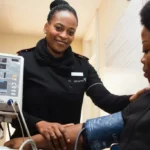Weddings are exciting and wonderful. You go all-in in celebration of love, commitment and true friendship. While all merry-making preparations are ongoing, an aspect you should never forget is your health status, both of you.
Health status is an all-around summary of your physical and psychological well-being. Thus, usually, when people make up their minds to go on the forever journey together, it is often advised (if not mandated) that they consult a doctor, run a series of check-ups, and take pre-marriage medical tests to ascertain their health status.
1. Early detection:
A great advantage pre-marriage medical tests offer you is early detection. Early detection offers an opportunity for treatment early on before the marriage.
2. Preparedness and protection:
Medical tests before the wedding would equip you and your partner with the needed information to keep yourselves safe and prepared in cases of diagnosed infections or conditions.
3. Ease decision-making:
Certain health concerns can frustrate compatibility and affect children negatively healthwise. A pre-marriage test can help couples make the right and most informed decisions in the interest of their wellbeing and that of their unborn children.
The Pre-marriage Medical Test Every Couple Should Do
So, what pre-marriage medical tests should a couple do? Below is a list of tests couples should take before their wedding:
1. Blood Group and Compatibility Tests:
On the top of the list of pre-marriage medical tests necessary for couples to get done is the blood group and compatibility tests. These tests usually help couples stay informed on their respective blood groups and compatibility for blood donation in future. Blood group and compatibility tests also keep the couple in the loop of risks and factors associated with rhesus disease – a condition that causes antibodies in a pregnant woman to destroy the blood cells of her foetus.
Checking blood group compatibility would automatically have your rhesus factors checked. In cases of incompatibility, you (the woman) would be prescribed Rh Immune globulin which is to help ease off risks associated with pregnancy by ensuring the healthiness and safety of the foetus if you are already pregnant or about to.
2. Genotype Check:
Genotype and genotype compatibility is important as a pre-marriage medical test because it affects future offspring directly. How so? The genotype of parents defines the genotype of offspring. Genotypes are integral players in your body’s genetic make-up and determine whether a future offspring could be a sickle cell carrier.
Given the seriousness of sickle cell disease, doctors often advise that specific genotype groupings should not pair up in marriage to avoid the risk of kid(s) with the sickle cell condition. They include AS, AC, SS, and SC genotypes.
The AUN health centre made a simpler breakdown for understanding on when to seek medical advice:
- AA + AA = AA, AA, AA, AA (Excellent)
- AA + AS = AA, AS, AA, AS, (Good)
- AA + SS = AS, AS, AS, AS, (Fair)
- AA + AC = AA, AA, AA, AC. (Good)
- AS + AS = AA, AS, AS, SS, (Very Bad)
- AS + SS = AS, SS, SS, SS, (Very Bad)
- AS + AC = AA, AC, AS,SS. (Bad; Advice needed)
- SS + SS = SS, SS, SS, SS, (Very Bad)
- AC + SS = AS, AS, SS, SS, (Very Bad)
- AC + AC = AA, AC, AC, SS. ( Bad; Advice needed)
3. STD Screening:
For couples who have been previously active sexually, it is always recommended to run screening on possible sexually transmitted infections including but not limited to syphilis, gonorrhoea, herpes, chlamydia, bacterial vaginosis, yeast infection to mention a few. Usually, the help this pre-marriage medical test offer is early detection and treatment. Early treatment would ensure that post-wedding, both of you are safe to lead a smooth and healthy sexual life.
4. HIV 1 & 11 and AIDS Tests:
HIV & AIDS are easily transmittable from one person to the other sexually or through sores, or cuts caused by using unsterilised sharp items like knives, clippers, scissors, etc. To stay safe, you are required to take tests. If positive, you would be required to start anti-retroviral medications.
Accordingly, infected persons would be advised and counselled rightly by doctors and professionals on how best to stay safe during sex, and the necessaries to do in consideration of childbearing.
5. Hepatitis:
Hepatitis is a liver attacking infection that can cause serious health concerns in future and even death. Hepatitis virus can be transmitted through a varying number of means including through body fluid, faeces, sex, as well as faecal-oral transmission. This could be through risky sex habits and oral take-in of faecal material either due to contaminated food or fingers.
Also, parties who have a history of multiple sexual partners, need to check themselves for hepatitis in all its variance.
6. Fertility Test:
Having kids is intricate and important when getting into the lifelong commitment of marriage, especially with premeditated health conditions, or even a history of fertility concerns in the family.
There are some things to check for fertility. Some include PCOS (polycystic ovary syndrome), hormonal imbalance, fibroids, cervical cancer, endometriosis in women, as well as sperm counts, prostate cancer, and sterility in men.
ConclusionThe tests highlighted above are non-exhaustive of the pre-marriage medical tests couples need to take. Hence, there are other tests your doctor may recommend on asking you a few questions and studying your medical history. To make well-informed decisions on your health status post-wedding, you should ensure you take necessary and recommended medical tests.
With Healthtracka, getting your pre-marriage medical tests done is easy and convenient. You could easily have samples taken from the comfort of your homes and your results right in your inbox within 24-48 hours.
What are you waiting for? Book a pre-wedding medical test here!




